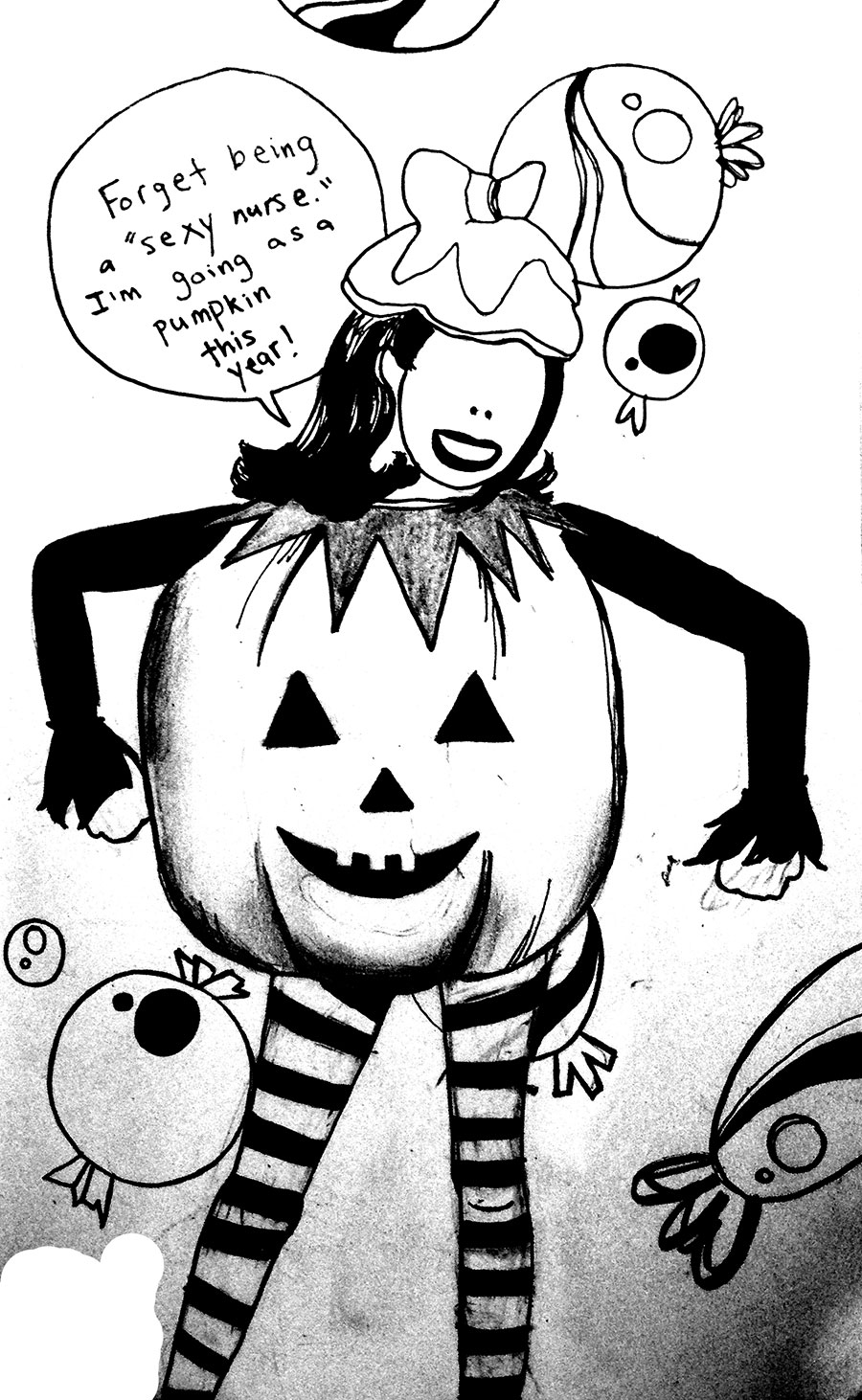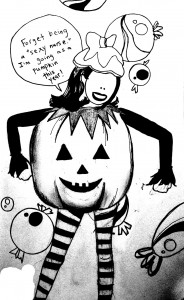Sexism of Halloween should be dispelled
Though the recent L.A. heat wave might not indicate it, Halloween is just around the corner. Local stores have already stocked up on all the essential seasonal items — candy, spooky decorations and, of course, Halloween costumes. For women, it seems like the possibilities are limitless: Greek goddess, flapper, princess, athlete, angel, vampire — the list goes on.
The only catch is that nearly every costume intended for women is either explicitly labeled “sexy” or reveals more skin, seeming to indicate that sexualizing women is the seasonal norm. Whether a woman chooses to dress in more clothing or less is not the issue. The real problem is the female objectification that occurs during this time of year and its many negative side effects.
A huge part of the problem is that this seasonal sexism is so ingrained in our culture that it’s easy to overlook. In Mean Girls — arguably one of this generation’s most popular comedy films — the main character observes, “Halloween is the one day a year when a girl can dress up like a total slut and no other girls can say anything else about it.” Of course, the comedy of this statement lies in its frank but accurate depiction of Halloween in the 21st century. In fact, many websites feature articles offering alternatives to the typical “sexy” costume. The title of a recent Huffington Post article says it all: “Halloween Costumes for Women Who Don’t Want to be Sexy Cops or School Girls.” The list is prefaced with a brief introduction, assuring readers that they “don’t have to settle for a ‘sexy,’ ‘naughty,’ garden-variety Halloween costume[s].” Of course, there is nothing blatantly amoral about the Huffington Post article or its clever ideas. Still, popular media sources like Huffington Post and websites like “Take Back Halloween!” display a need to pin non-“sexy” costumes as alternatives, showing the prevalence of sexualized female costumes.
The problem with “sexy” Halloween costumes also transcends unoriginality. The dominance of racy female costumes reveals the underlying sexism fueling this trend. In a 2013 Daily Orange article, Laura Cohen, a student at Syracuse University, remarked that the “market hardly allows [for other options]. The costumes available for women are mainly oversexualized, featuring short skirts and low-cut tops.” This is a predominantly female trend, however. A quick perusal of Party City’s website is enough to prove that the ratio of “sexy” female costumes to “sexy” male costumes is alarmingly high. In 2013, the Huffington Post featured an article entitled “Cal Consent Campaign Posters Remind You Halloween Costumes Aren’t An Excuse To Be Rapey.” While the campaign’s goal of consent awareness is admirable, only one image included in the article depicts a male body. This says a great deal about modern culture; the only reason for the posters to depict more women than men would be if this were an issue of sexism.
And yet, the biggest problem with “sexy” costumes is that many counterarguments only add fuel to the fire. The idea that women should not dress a certain way because they might invite sexual assault just paves the way for victim-blaming — the idea that women are responsible when they are raped. Worst of all are critics who do not present a solid argument whatsoever, instead choosing to refer to women in revealing costumes as “sluts.” In the words of Cohen, labeling women as “slutty,” during Halloween or any other time of the year, “reinforces ideologies that harm women and does not move us any closer toward gender equality.” Even someone who advocates against sexualizing women during Halloween adds to the problem when he or she uses the term “slut” to illustrate their point. Someone’s worth as a person should not hinge on his or her sex appeal in any way; the use of this word degrades the subject and paves the way for the dehumanization of women in general.
Essentially, the problem with “sexy” costumes lies not in one particular costume or style but in the sexism surrounding the entire trend. If someone chooses to wear a “revealing” costume, so be it. As Cohen points out, “We do not need to strip all racy Halloween costumes from stores’ shelves, nor should we shame women who want to wear them.” A greater selection of costumes for women might help the problem, but the greatest issue is the mindset surrounding this holiday.
Women are not sexual objects. They should not be afraid to feel too conservative or too sexy based on their choice of apparel, nor should they be afraid that their body is inadequate or that their costumes are invitations for rape. What Halloween needs is a new level of female respect.



Superman, Spiderman, Wolverine…almost any male character suitable as a Halloween costume choice for guys rocks the 6 pack abs that most guys do not have. Yet you will find the pudgy superheros as well as the yoked out guys because first and foremost, Halloween should be about having fun – not another moment to stand on a soapbox and become sanctimonious and preachy… Sexy costumes exist for one and one reason only – they sell! And guess who’s buying them! People who want them!
““Halloween is the one day a year when a girl can dress up like a total slut and no other girls can say anything else about it.” — yeah right – like girls refrain from passing judgement just because it is Halloween – what a joke.
BTW – let’s not pretend this “huge” problem of sexism exists only on Oct 31st. There are plenty of tight t-shirt under-boob and tight yoga pants butt shots all year long. Just walk along the Row on any Thursday night and there are plenty of exposed T&A for people to pretend to be self righteous about.
Jennifer has a point: The emphasis on “sexy” costumes for little girls is disgusting. Sadly, all too many moms buy these costumes. The bad news is that moms make it worthwhile for the manufacturers to sell such trash, and those companies are in business to sell and make a profit. (Yes, I doubt that dads buy such costumes.)
But here is the good news: 1)No mom is obliged to do this to a daughter; and 2)Most costumes and masks are not sexy little girl costumes. The choices of other costumes are broad. No need exists to make a little girl look like a sex object.